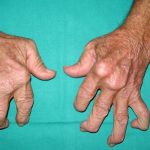Dizziness
Dizziness and fainting, or syncope, is another symptom of pulmonary hypertension. Syncope is often caused by a lack of blood flow or oxygen to the brain. Lightheadedness does not always lead to syncope, but it does indeed put you at risk for losing consciousness, especially when you experience shortness of breath and erratic cardiac rhythms.

When the lungs cannot oxygenate blood properly, the body and brain become starved of energy. Before becoming dizzy, you might start to feel sluggish and suffer from brain fog. If this is paired with other symptoms on this list, be sure to call a medical professional as soon as possible, since dizziness and fainting can be dangerous.
More from Things Health
-
The Most Common Causes of Atrial Fibrillation
Atrial fibrillation, Afib, is an abnormal heart rhythm, also known as an arrhythmia. Atrial fibrillation is described as rapid and irregular beating of the atrium,…
-
Symptoms of Gout
Gout is a form of inflammatory arthritis characterized by recurrent attacks of a red, tender, hot, and swollen joint. Pain typically comes on rapidly in…
-
Symptoms Of Rheumatoid Arthritis
Rheumatoid arthritis is a chronic autoimmune illness, which accompanies irritation of the joints and apparent deformities. Maybe a virus, causes an attack on the synovium…
-
Mindfulness And Meditation
Meditation was found to have a favorable influence on the body, brain, and spirit. Successful direction of persistent pain, reduction in blood pressure level, and…
-
Symptoms Of Epilepsy
Epilepsy a neurological disorder marked by sudden recurrent episodes of sensory disturbance, loss of consciousness, or convulsions, associated with abnormal electrical activity in the brain.…






